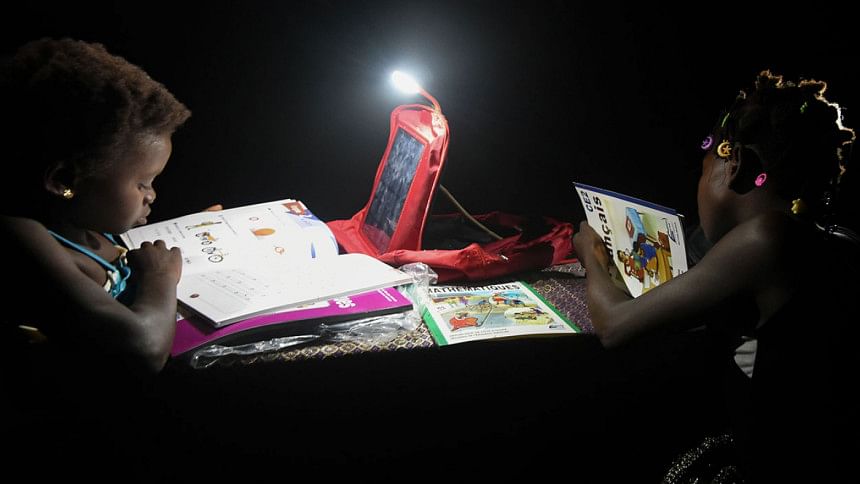Poor Ivory Coast pupils' ray of hope: solar backpacks

The equatorial sun has been up for about an hour as a gaggle of children set off from the Ivorian village of Allepilla on their hour-long trek to school.
Back home in the evening, eight-year-old Marie-France Amoandji Ngbessoo does her homework by the light of her backpack's LED -- captured by solar panels on her way to and from school.
The light can run for three hours.
With insects flitting overhead, Marie-France points to the pictures in her textbook, identifying them: "Orange, plane..."
Allepilla, some 100 kilometres (60 miles) north of the West African country's economic capital Abidjan, is a rural community centred on cocoa and coffee production.
A single pump supplies water to the village of around 400 inhabitants including 150 children, and, as is the case for thousands of villages and hamlets across the country -- there is no electricity.
Instead, oil-burning storm lanterns and battery-powered torches are the only sources of light.
An Ivorian charity that promotes education for rural girls, Yiwo Zone, has raised funds to provide the backpacks -- which cost 13,000 CFA francs (20 euros, $23) apiece -- to schoolchildren across Africa.
Computer salesman Evariste Akoumian had the idea for the solar backpack in 2015 when his car broke down as night was falling near Soubre, in the southwest of the country.
"At the same time, children were returning home from school," he recalls. "I said to myself, 'We must give them light so they can study. It's not normal for rural children to be unable to do so."
The Ivorian government has set a target of ensuring electricity to 80 percent of the country.
"These rural children are poor. They use rice sacks or plastic bags to take their things to school," Akoumian said. "The idea was to kill two birds with one stone: give them a backpack with a light to go with it."
The entrepreneur stressed that the solar backpacks belong to the children: "So Dad or Mum can't come and take the light from them... to use while they are cooking or doing housework."
Sales are brisk and have reached 55,000. Akoumian's company Solarpak already sells the backpacks in Gabon, Madagascar and Burkina Faso, as well as to charities in France and Germany.
Striving to keep up with demand, Akoumian seeking aid or loans so that he can set up an assembly plant in Abidjan and boost production.
Better marks
"It may seem cheap, but these are large sums that the villagers don't have," said Anna Corinne Menet Ezinlin, head of Ywo Zone. "Here in this village some people can't afford the school fees or even notebooks. Usually school is free, but there are always registration fees or (other) payments."
Last year, Marie-France's 13-year-old sister Lucienne could not attend school at all because their mother was off work with an illness.
"It's hard for the children," said village chief Jean-Baptiste Kotchi Okoma, whose seven-year-old daughter Nethania received a solar backpack. "There's not enough money here."
He added: "I hope their marks will be better. Children are disadvantaged here. With the backpack, I hope they will all progress."
Lucienne, flipping through a book, said, "I am happy. Before it was more difficult. It's easier now, with the backpack."

 For all latest news, follow The Daily Star's Google News channel.
For all latest news, follow The Daily Star's Google News channel. 








Comments